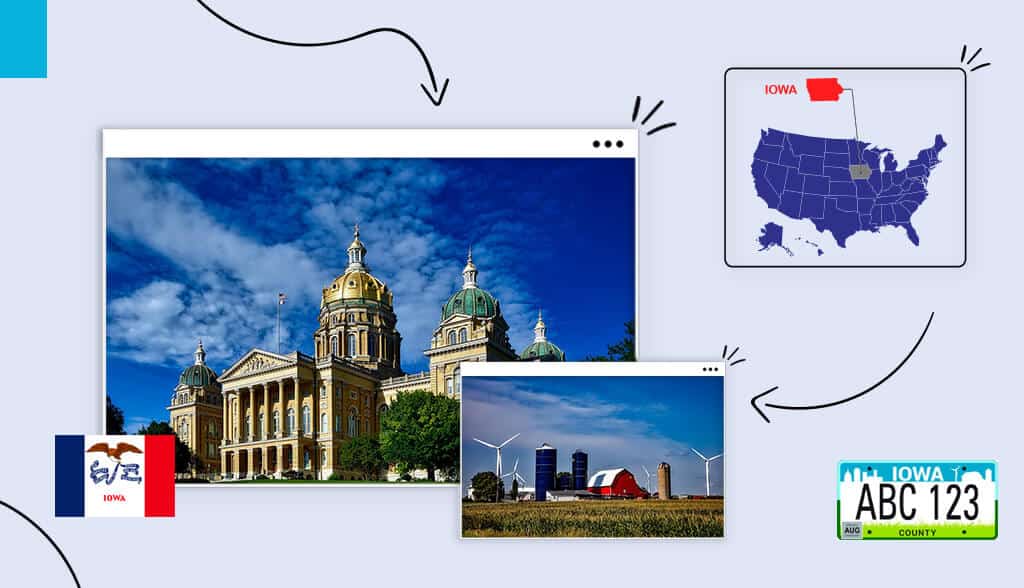
Home » How to Start a Small Business » Start a Business in Iowa
Iowa’s innovative business and educational history are legendary.
The Hawkeye state was the first to enact laws to protect female workers and open a coeducational and interracial college.
And that innovation continues today.
Iowa’s thriving economy, driven by low business taxes, affordable living, a strategic location, and entrepreneurial incentives, offers many opportunities for aspiring entrepreneurs.
But you need more than a thriving economy, a convenient location, and low taxes to become successful.
Anyone starting their own business should get informed about the right steps to follow, to set themselves up for success.
Let’s look at how to start a business in Iowa to give you what you need:


You can create your business plan today using our free template and guide.
Your business idea determines your location.
For instance, retail businesses, beauty salons, and restaurants need a location with a high passing trade and possibly parking. Product manufacturers require locations with convenient access and space, like an industrial estate.
Before choosing your location, review your business plan’s financial section and startup/running budget to ensure you can afford it.
Some thriving cities to start a business in Iowa include Des Moines, Cedar Rapids, Dubuque, Ames, Iowa City, and Sioux City.
But before signing a lease agreement, consider the zoning laws!
Most US states, counties, and cities have zoning laws that control parking requirements, waste disposal, signage regulations, and what businesses can operate in which locations. To ensure your chosen locations meet your operation requirements, review local ordinances, visit your area planning department, or check your local government website.
Are you going to start an online business, open a brick-and-mortar store, or provide a local service? If so, you need an online presence so people can find you, see what you offer, read testimonials, and make a purchase or an appointment. To do that, you’ll need:
Next, you need a great business name:

Your business name must convey what you sell or provide, apply to your niche, project your brand’s essence, and engage and connect with your target audience’s emotions.
But that’s not all it must do!
Your new name should also be available as a domain (or as close as possible), and your chosen social media platforms have no trademark restrictions and comply with Iowa’s business name requirements.
Here’s what you need to know:
A DBA (Doing Business As) is any name you use other than the name under which you formed your business.
All separate entities (LLCs, LLPs, and Corporations) file their name with the Iowa Secretary of State’s Office when forming their business; non-separate entities like sole proprietorships and general partnerships use their owner’s names.
All, however, can use a niche, product, or service-relevant brand name by registering a Fictitious Name Resolution with the Iowa Secretary of State.
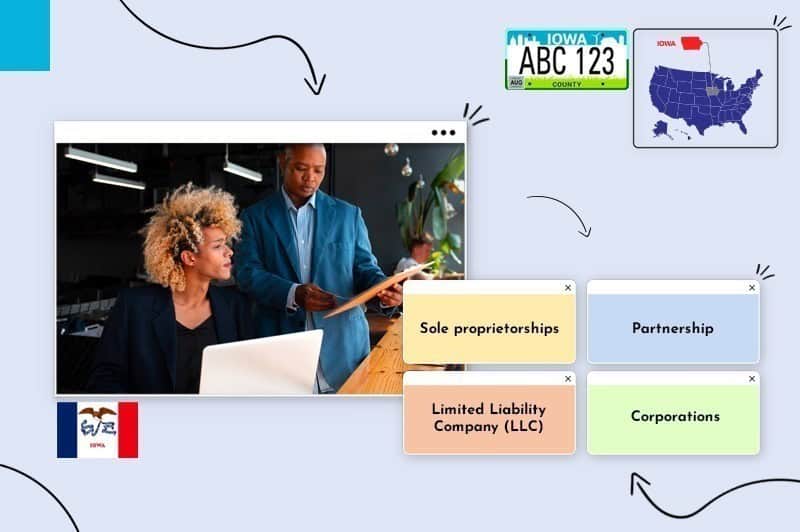
A business structure is an entity under which you run your business. For example, sole proprietorships are non-separate entities, while LLCs are separate, and the two have distinct legal differences. Such as liability protection, if and how you register your business, and how you pay taxes. In Iowa, specific structures suit small to medium startups:
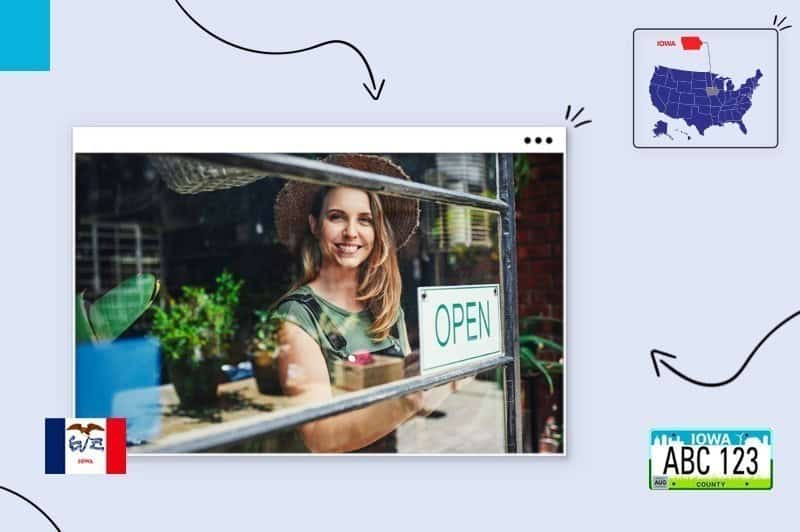
To run your business structure in Iowa, you must first register it with the relevant government department.
In Iowa, those are:
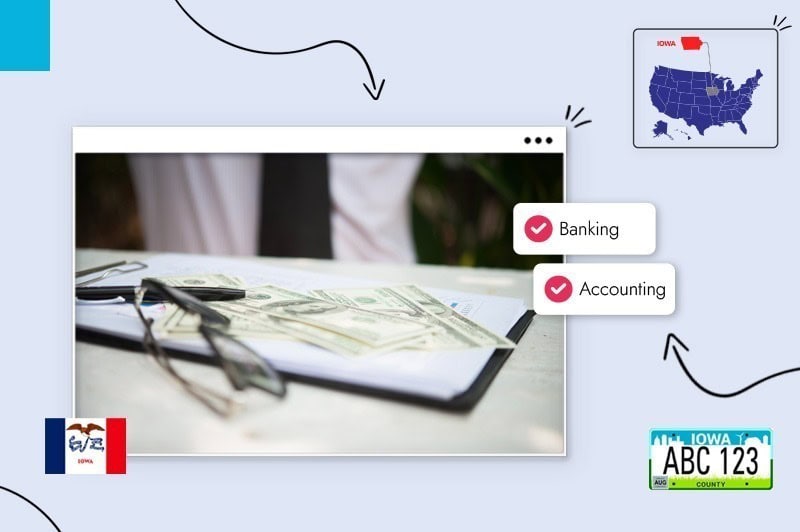
To start a business in Iowa and run it efficiently, you need many things, including a separate business account, business credit cards, and an adequate accounting system. With those in place, your businesses’ financial health will run like clockwork. Let’s break them down to see why:
Registered business structures like LLCs, LLPs, and Corporations must have separate business bank accounts to protect their limited liability.
Sole proprietors and general partnerships do not; however, they also benefit from a business bank account because it simplifies their bookkeeping and accountancy requirements by separating their personal and business income and expenses, which helps control their cash flow and calculate their tax liabilities.
All businesses can benefit from having a credit card to cover unexpected material or equipment costs, payroll expenses, or the odd slow month.
An experienced accountant can help you reduce your tax liabilities by using authorized tax deductions and ensure you comply with federal, state, and local tax obligations and payroll duties.

Many entrepreneurs need funding to start their businesses; if that’s you, many options are available to help turn your business idea into a successful and life-changing endeavor. Here’s what’s available:
The Iowa government provides grants and tax incentives to nurture growth throughout the Hawkeye State to help startups and existing businesses expand, hire employees, and entice out-of-state entrepreneurs to choose Iowa as their place of business.
Some are state, and others are by county or city, so you must research relative to your location. When you find an eligible tax incentive or grant, apply correctly.
Here’s a list of Iowa departments that can help you:
Other entities also have resources available to assist you when starting a business in Iowa:
The SBA helps American entrepreneurs start, run, and grow their businesses through its state field offices and financial lender partnership programs that provide long-term and low-interest rate business loans.
To see what’s available in the Hawkeye State, visit the SBA Iowa district office.
And follow these links if they apply to your situation:
Most businesses need insurance to protect against loss or damage, unforeseen disasters, or personal injury claims. The insurance you need depends on your business and if you’ll hire employees. That said, 7 policies are the most common with SMBs:
The Hawkeye State requires employers to have workers’ compensation insurance to cover any employee’s medical costs or lost earnings due to work-related injuries or illnesses.
Pro tip:
For more information on worker’s compensation reporting, visit the Iowa Department of Inspections, Appeals & Licensing website.
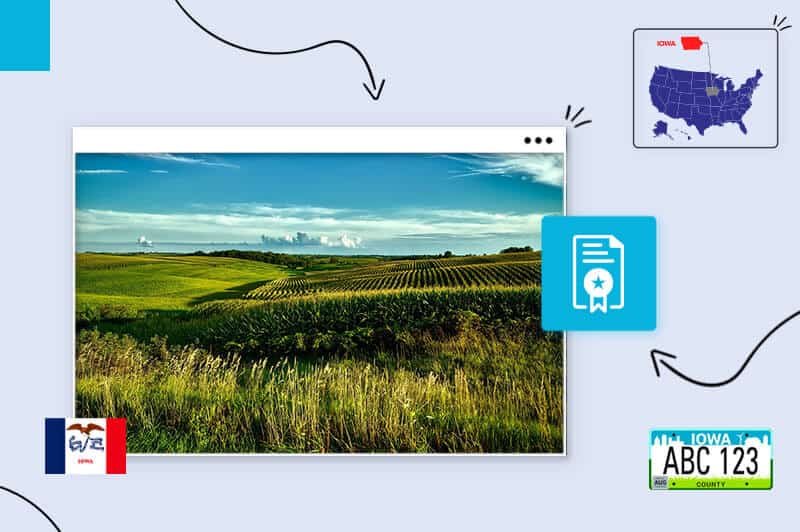
Iowa doesn’t have a general all-purpose state license. Still, you must register your startup with the Secretary of State and apply for a business tax permit with the Iowa Department of Revenue.
Next, determine whether your business needs local, state, and federal licenses or permits.
Here’s how:
Although Iowa doesn’t require a general state license, certain professions and businesses selling specific goods and services need the following licenses.
Iowa’s low tax rates make Hawkeye State the perfect location for aspiring entrepreneurs looking to ease their business tax burden.
But your taxes aren’t only at the state level when you start a business in Iowa. You’ll also have federal and local taxes to consider.
Pro Tip:
Some local businesses can get tax credits and exemptions. To learn more, visit the Iowa Department of Revenue’s tax credits and exemptions page.

Building the team your new business needs to run effectively is more than finding people who suit your brand’s personality; you must also comply with federal and state employment payroll laws and regulations.
Iowa employers must adhere to federal and state employee regulations before hiring staff and during their employment tenure.
Regulations include:
Payroll regulations ensure employers treat their employees fairly and comply with state laws.In Iowa, those regulations include:
Besides adhering to employee rights, you must also:
But you can avoid Iowa hiring and parole requirements by employing contractors!
Under their instruction, contractors provide a temporary service and pay their taxes and insurance.
You can hire contractors for many services to help grow your business while reducing your labor costs, which is a must for many new business owners on a tight budget.
For example, you can hire a website developer, SEO consultant, and social media marketing expert to establish and maintain your online presence, an electrician to assist in construction jobs, or an accountant for your tax requirements, all on a need-only basis.
For further information on hiring contractors, visit the Iowa DOR contractors guide.
Hey! You’re ready to start a business in Iowa. Well done.
Let’s finish with some FAQs that should answer any outstanding questions.
Besides the steps in this post, you’ll need an entrepreneurial spirit and the skills to take your vision and turn it into a thriving business.
The answer depends on the type of business you want to start in Iowa, your chosen business structure, and if you’ll have employees. Read my “Business startup costs business owners need to know for more info.”
Much online information is available to help you start a business as a beginner, especially here at Tailor Brands. But also use the Small Business Administration, as their goal is to help entrepreneurs fulfill their dreams.
That’s tricky to answer because the right business for you depends on your interests, skills, finances, and situation. However, if you need inspiration, check out our 11 Great Small Business Ideas to Start in 2025 and 5 Creative Ways to Come Up with a Business Idea.
That, my friends, is how to start a business in Iowa.
Remember, a tiny seed can only become a 350-foot Redwood with the right environment and nutrition. The same applies to your entrepreneurial journey by: choosing a viable business idea and getting the support you need to help it grow.
But that also applies to you, so look after yourself.
This portion of our website is for informational purposes only. Tailor Brands is not a law firm, and none of the information on this website constitutes or is intended to convey legal advice. All statements, opinions, recommendations, and conclusions are solely the expression of the author and provided on an as-is basis. Accordingly, Tailor Brands is not responsible for the information and/or its accuracy or completeness.
Products
Resources
©2025 Copyright Tailor Brands